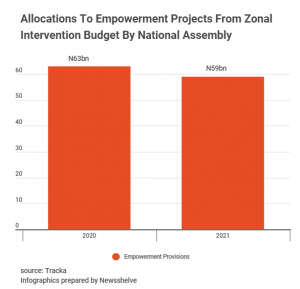Tracka, an arm of BudgIT that tracks the implementation of government projects in various communities across the country, using the necessary tools (#Officeofthecitizen) for collaborating, tracking and giving feedback on public projects, has raised concerns over the allocation of over N59 Billion to empowerment projects out of the N100 billion 2021 Zonal Intervention Projects (ZIPs) nominated by members of the National Assembly.
In a statement Traka said it is discouraging that elected representatives have consistently nominated empowerment projects that add less value and impact on citizens’ welfare thereby prioritizing political patronage over sustainable and incremental grassroots development which is the primary purpose of ZIPs.
Tracka’s review of the constituency projects reveals that from 2016 till date, over 50% of projects nominated by lawmakers are mainly empowerment projects. According to Tracka, a whopping N63 billion and N59 billion were allocated for empowerment provisions in 2020 and 2021, respectively.

“Suffice it to say that these empowerment projects were nominated without a proper needs assessment by elected representatives. While we advocate for genuine citizen empowerment, the current mode of selection and disbursement is, to say the least, questionable,” the statement read.
“How do politicians come to determine the empowerment needs of their constituents without needs assessment nor inclusion in the decision-making process, and how do they determine the beneficiaries? It is hard not to think that most of the beneficiaries are party loyalists,” the statement further queried.
Additionally, Tracka found that over 1,112 projects are captured under agencies that do not have the expertise and capacity to execute them. For instance, N250m was allocated to construction and installation of all-in-one solar-powered street lights in selected locations in Uvwie, Delta State Central Senatorial District. This project, according to Tracka, was captured under the Nigerian Institute of Oceanography Marine Research in Lagos state. “Projects like this make us raise concerns as the ministry in question does not have the competence to execute electricity projects.”
“Speaking of other irregularities, we observed that projects totaling N1.5 billion were without specific locations. For example, N250 million was allocated for the supply of motorcycles, grinding machines and sewing machines to selected women and youths in the North Central. However, there was no project location, and these projects were captured under the Ministry of Water Resources, an agency that is expected to execute water-related projects in rural communities.” The statement noted.









Comment here